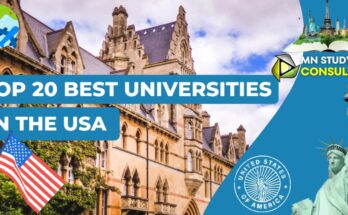Introduction: Understanding the Importance of Scholarships
In today’s competitive educational landscape, scholarships play a crucial role in enabling students to achieve their academic goals. Scholarships provide financial assistance that alleviates the burden of tuition fees.
- Accessibility: They make education accessible to students from various economic backgrounds.
- Encouragement: Scholarships motivate students to excel academically and engage in extracurricular activities.
- Debt Reduction: They help reduce the student debt load, allowing graduates to start their careers with less financial stress.
Ultimately, scholarships contribute significantly to a student’s personal growth and professional development by providing both financial support and fostering academic excellence.
How to Identify the Right Scholarship for You
Identifying the right scholarship requires careful research and consideration of personal academic and financial needs.
- Assess Academic Background: Review GPA, test scores, and field of study to match criteria.
- Research Scholarships: Utilize scholarship databases, university websites, and counseling offices.
- Eligibility Requirements: Check prerequisites such as citizenship, residency, ethnicity, or gender.
- Application Procedure: Note deadlines, required documents, and submission formats.
- Financial Need: Prioritize scholarships that align with financial aid requirements.
- Career Goals: Look for scholarships related to future professional aspirations.
Taking these steps ensures a tailored scholarship search for individual success.
Top National Scholarships for U.S. Students in 2023
Several prestigious national scholarships provide exceptional opportunities for U.S. students to pursue higher education. Key scholarships include:
- Rhodes Scholarship
- For graduate study at the University of Oxford.
- Selection based on academic excellence, leadership, and character.
- Fulbright U.S. Student Program
- For international study/research or English teaching assistantships.
- Aimed at fostering mutual understanding between nations.
- Gates Cambridge Scholarship
- For postgraduates at the University of Cambridge.
- Awarded to individuals demonstrating outstanding intellectual ability and leadership potential.
- Marshall Scholarship
- For graduate study in the UK.
- Recognizes academic merit and ambassadorial potential.
- Harry S. Truman Scholarship
- For students pursuing public service-related careers.
- Focused on leadership, public service commitment, and academic potential.
Top International Scholarships for Global Students in 2023
Numerous international scholarships are designed to support global students in their academic endeavors. Some of the top scholarships for 2023 include:
- Fulbright Scholarships: Offers funding for graduates, professionals, and artists looking to study, teach, or conduct research.
- Chevening Scholarships: Funded by the UK government, it supports outstanding emerging leaders from around the world.
- Erasmus Mundus Scholarships: Provides funds for students to study in multiple countries within the European Union.
- DAAD Scholarships: Offered by the German Academic Exchange Service for students from developing countries.
- Commonwealth Scholarships: Granted to students from Commonwealth nations, covering a range of disciplines.
Field-Specific Scholarships: Opportunities for STEM, Arts, Humanities, and More
Certain universities provide scholarships tailored to specific fields of study, recognizing diverse academic pursuits. These scholarships include:
- STEM Fields: Scholarships for science, technology, engineering, and mathematics students often cover tuition, research grants, and internships.
- Arts: Scholarships for visual arts, performing arts, and music students might include funding for materials, tuition, or special projects.
- Humanities: Literature, history, and philosophy students can access scholarships offering grants for study abroad, research, and seminars.
- Social Sciences: Programs in psychology, sociology, and political science frequently have dedicated scholarships for fieldwork and conferences.
Need-Based vs Merit-Based Scholarships
When considering scholarships, it’s crucial to understand the difference between need-based and merit-based awards.
Need-Based Scholarships:
- Determined by the student’s financial situation
- Evaluates household income and assets
- Often requires filling out the FAFSA or similar forms
Merit-Based Scholarships:
- Based on academic, artistic, or athletic achievements
- Often considers GPA, test scores, or performance in extracurricular activities
- Can be awarded by universities, private organizations, or government bodies
Both types come with distinct criteria and application processes. Students should thoroughly research and apply accordingly to maximize their opportunities for financial aid.
Application Tips: How to Craft a Winning Scholarship Application
Crafting a winning scholarship application involves strategic preparation and attention to detail.
- Read Instructions Carefully: Ensure all requirements are understood.
- Tailor Each Application: Customize responses to align with each scholarship’s goals.
- Showcase Achievements: Highlight academic and extracurricular accomplishments.
- Strong Personal Statement: Write a compelling narrative reflecting goals and motivations.
- Proofread Thoroughly: Remove any errors to maintain a professional presentation.
- Gather Strong Recommendations: Secure letters from reputable sources.
- Meet Deadlines: Strictly adhere to submission deadlines to avoid disqualification.
Scholarship Scams: How to Avoid Common Pitfalls
Ensuring that students avoid scholarship scams is crucial. Here are some strategies to safeguard against these pitfalls:
- Research: Verify the legitimacy of the scholarship offering by cross-referencing with trusted educational websites.
- Application Fees: Be wary of scholarships that require an application fee; most legitimate scholarships are free to apply for.
- Personal Information: Avoid providing unnecessary personal information such as Social Security numbers or bank details.
- Promises: Be skeptical of guaranteed scholarships or claims that seem too good to be true.
- Contact Information: Verify the contact details of the scholarship provider and ensure they are reputable.
Leveraging Community Resources to Find Less-Known Scholarships
Universities, local libraries, community centers, and non-profit organizations are excellent resources in identifying lesser-known scholarships. Engaging with these institutions can uncover opportunities not typically highlighted in more mainstream platforms.
- University Financial Aid Offices: They often maintain a database of niche scholarships.
- Local Libraries: Host scholarship directories and workshops.
- Community Centers: Provide bulletin boards and mentoring programs.
- Non-profits: Many smaller grants are frequently announced through non-profit networks.
Networking with alumni and community leaders can also yield valuable scholarship leads, enriching the search process with personalized guidance.
Tips on Managing Multiple Scholarship Applications
Managing multiple scholarship applications requires organization and diligence. Here are several tips to streamline the process:
- Create a Master Calendar: Schedule deadlines and reminders for each scholarship.
- Organize Documents Efficiently: Keep transcripts, letters of recommendation, and personal statements in one place.
- Prioritize Applications: Focus on scholarships that best match the applicant’s qualifications and needs.
- Track Progress: Use a spreadsheet to monitor each application’s status.
- Personalize Each Application: Tailor essays and responses according to the specific scholarship criteria.
- Seek Assistance: Obtain feedback from mentors or advisors.
Post-Scholarship Responsibilities and Opportunities
Upon receiving a scholarship, scholars must fulfill various post-award commitments.
- Maintaining Academic Standards: Recipients are generally required to maintain a minimum GPA to keep their scholarship active.
- Reporting and Documentation: Scholars must regularly submit academic progress reports and other documentation as required by the funding body.
- Service Obligations: Some scholarships require recipients to perform community service or participate in specific projects related to their field of study.
- Networking and Alumni Engagement: Scholars are encouraged to join alumni networks and engage in events, fostering professional relationships and opportunities.
- Continued Professional Development: Scholarship recipients may be expected to attend workshops, seminars, or conferences to further their education and expertise.
Conclusion: Maximizing Your Scholarship Potential
To maximize scholarship potential, an individual should:
- Research Thoroughly: Investigate various universities and available scholarships. Utilize online platforms, university websites, and community forums.
- Meet Deadlines: Ensure timely application submission to avoid disqualification.
- Tailor Applications: Customize each application to highlight strengths and fit the scholarship criteria.
- Seek Recommendations: Obtain strong letters of recommendation from credible sources.
- Prepare for Interviews: Practice interview techniques, focusing on articulating goals and achievements.
- Maintain Academic Excellence: Consistently high grades can significantly enhance scholarship opportunities.
Effective planning and detailed attention to these steps can increase scholarship success rates.



